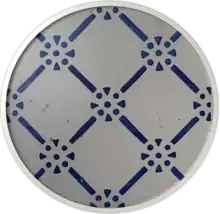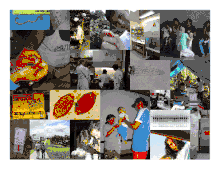Iquitos Satellite Laboratory (IQTLAB)
The Iquitos Satellite Laboratory (IQTLAB) was established in 2002 in the city of Iquitos, Peru by doctor Margaret Kosek,[1] biologist Maribel Paredes Olortegui,[2] and nurse Pablo Peñataro Yori,[3] with the collaboration of the Dr. Robert Gilman working group in Lima,[4] Peru and the US Naval Medical Research Unit No. 6 (NAMRU-6) .

The Iquitos Satellite Laboratory (IQTLAB) is supported through NIH and the Bill & Melinda Gates Foundation funded grants.
Purpose
The mission of IQTLAB is to improve understanding of health problems among vulnerable populations in order to identify sustainable solutions that improve their health, social and economic conditions.
Team Members
The IQTLAB team consists of experts from Asociación Benéfica Prisma, the University of Virginia, the Johns Hopkins Bloomberg School of Public Health,[5] and the Tulane University School of Public Health and Tropical Medicine,[6] among other universities and research institutions worldwide. IQTLAB utilizes a multidisciplinary approach that combines knowledge of the epidemiology of tropical infectious disease, malnutrition, intestinal infection, biostatistics, medical science, demography, ecology, and spatial data collection and analysis.

The Iquitos Satellite Laboratory (IQTLAB) team is led by Margaret Kosek, MD, an associate professor of infectious disease at the University of Virginia Department of Medicine.
Operations

The research center is approximately 4,000 square feet (370 m2) and is capable of conducting sophisticated laboratory diagnostics and experiments. In addition to the laboratory, IQTLAB provides a vast array of support for scientific data collection, including GPS/GIS data collection, survey data collection, satellite image processing, and climate conditions (strategic deployment of weather monitoring systems).
IQTLAB currently has a number of ongoing projects, including:
- Etiology, risk factors and interactions of enteric infections and malnutrition and the consequences for child health and development
- Probiotics for Pediatric Diarrhea in Peru
- Epidemiology of campylobacters in the Peruvian Amazon
- Epidemiology of shigellosis in the Peruvian Amazon
- Serologic assessment of burden of diarrheal disease in children under 5 years old
- Improved Biomarkers for the Assessment of Environmental Enteropathy
- The development of a simple test for small bowel barrier dysfunction applicable to environmental enteropathy
- Global Infectious Disease Training Grant
Since its foundation, the Iquitos Satellite Laboratory (IQTLAB) has been the host and support of national and international students from undergraduate to master and MD/PhD programs.
References
- "The University of Virginia". The University of Virginia. Retrieved 2019-04-11.
- "Inicio". Prisma ONG (in Spanish). Retrieved 2019-04-11.
- https://www.researchgate.net/scientific-contributions/39919623_Pablo_Penataro_Yori
- "UPCH - UNIVERSIDAD PERUANA CAYETANO HEREDIA - PORTAL INSTITUCIONAL". www.cayetano.edu.pe. Retrieved 2019-04-11.
- Health, JH Bloomberg School of Public. "Johns Hopkins Bloomberg School of Public Health". Johns Hopkins Bloomberg School of Public Health. Retrieved 2019-04-11.
- "School of Public Health and Tropical Medicine | Advancing public health for more than a century, in New Orleans, Louisiana, the world". sph.tulane.edu. Retrieved 2019-04-11.